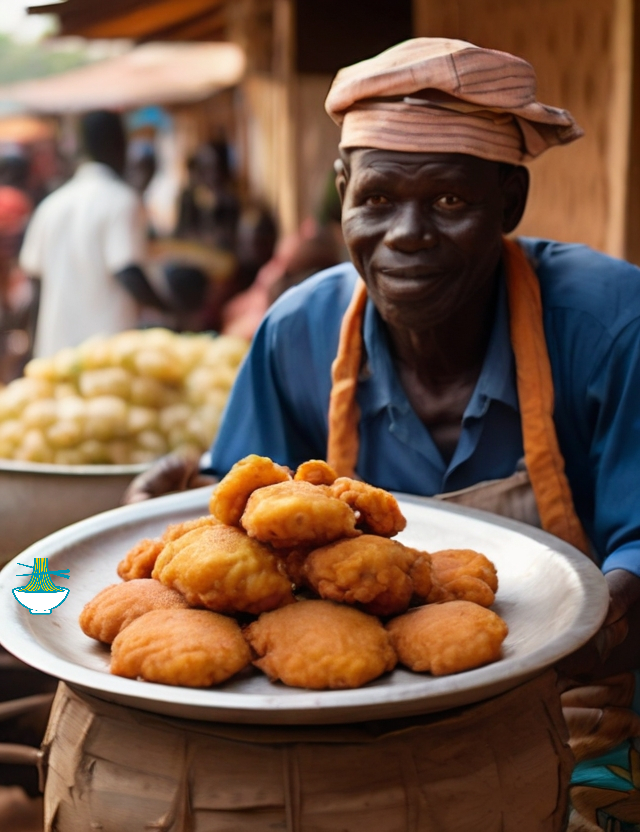Embark on a culinary journey to the vibrant land of Burkina Faso, where flavors dance in harmony and traditions come alive through every bite. In the heart of this West African gem, we discover the beloved Akara, a cherished culinary treasure that reflects the rich cultural tapestry of Burkina Faso. Akara, a delightful and nutritious fritter, embodies the essence of community, celebration, and the warmth of home-cooked goodness.
As we delve into the intricacies of this traditional recipe, we'll explore the art of preparing Akara, from selecting the finest ingredients to mastering the unique techniques that transform them into golden, crispy orbs of culinary perfection. Join us on this culinary adventure as we unlock the secrets of Burkina Faso's Akara, a dish that not only nourishes the body but also nourishes the soul with the spirit of African hospitality.

Ingredients:
- 2 cups black-eyed peas, soaked overnight
- 1 medium-sized onion, finely chopped
- 2-3 fresh green chilies, finely chopped
- 2 cloves garlic, minced
- 1 teaspoon ginger, grated
- Salt to taste
- 1/2 teaspoon baking soda
- Vegetable oil for frying
Instructions:
Prepare the Black-Eyed Peas:
1-After soaking the black-eyed peas overnight, drain and rinse them thoroughly.
2-In a food processor, grind the black-eyed peas to a coarse paste without adding any water. The texture should be slightly gritty.
Mixing the Ingredients:
1-In a large mixing bowl, combine the ground black-eyed peas with chopped onions, green chilies, minced garlic, grated ginger, and salt.
2-Mix the ingredients thoroughly until well combined. The consistency should be thick enough to hold its shape.
Adding Baking Soda:Incorporate baking soda into the mixture and mix well. Baking soda helps to make the Akara fluffy when fried.
Frying the Akara:
1-In a deep pan or skillet, heat vegetable oil over medium-high heat for frying.
2-Take a spoonful of the mixture and carefully drop it into the hot oil. Repeat the process, ensuring not to overcrowd the pan.
3-Fry until the Akara turns golden brown on all sides, flipping as needed. This should take about 3-4 minutes per batch.
Draining Excess Oil:Once the Akara is golden and crispy, use a slotted spoon to remove it from the oil and place it on a plate lined with paper towels to absorb any excess oil.
Serve and Enjoy:Serve the Burkina Faso Akara hot and fresh. It can be enjoyed on its own or with a side of spicy dipping sauce for an extra kick.
This Burkina Faso Akara recipe captures the essence of a popular street food that embodies the country's culinary traditions. Share these delightful fried bean cakes with friends and family, savoring the authentic taste of Burkina Faso's vibrant street food culture.
Nutritional Values
Nutritional values can vary based on factors such as the specific variety and brand of ingredients used. However, I can provide approximate nutritional values for some common components:
Black-Eyed Peas (2 cups, soaked):
- Calories: 450 kcal
- Protein: 25g
- Carbohydrates: 85g
- Dietary Fiber: 24g
- Fat: 1g
- Iron: 5mg
- Magnesium: 100mg
Benefits: Rich in protein, fiber, and essential nutrients. Black-eyed peas provide a good source of iron, magnesium, and contribute to heart health.
Onion (1 medium-sized):
- Calories: 45 kcal
- Protein: 1g
- Carbohydrates: 11g
- Dietary Fiber: 2g
- Fat: 0g
- Vitamin C: 10mg
Benefits: Onions are low in calories and high in vitamin C. They also contain antioxidants and anti-inflammatory properties that may contribute to overall health.
Green Chilies (2-3, finely chopped):
- Calories: 10 kcal
- Protein: 0.5g
- Carbohydrates: 2g
- Dietary Fiber: 1g
- Fat: 0g
- Vitamin C: 30mg
Benefits: Green chilies are a good source of vitamin C and antioxidants. They may boost metabolism, enhance digestion, and provide a mild spicy flavor to dishes.
Garlic (2 cloves, minced):
- Calories: 10 kcal
- Protein: 0.5g
- Carbohydrates: 2g
- Dietary Fiber: 0g
- Fat: 0g
- Vitamin C: 1mg
Benefits: Garlic is known for its potential health benefits, including immune system support, cardiovascular health, and anti-inflammatory properties. It adds flavor without excess calories.
Ginger (1 teaspoon, grated):
- Calories: 2 kcal
- Protein: 0.1g
- Carbohydrates: 0.5g
- Dietary Fiber: 0g
- Fat: 0g
- Iron: 0.1mg
Benefits: Ginger is renowned for its anti-nausea and anti-inflammatory properties. It can aid digestion, reduce muscle pain, and contribute to overall immune system health.
Salt (to taste):
- Sodium content can vary based on the amount used. It's essential to monitor sodium intake based on individual dietary needs.
Benefits: Sodium is an essential electrolyte that helps maintain fluid balance and nerve function in the body. However, moderation is key as excessive sodium intake may have adverse health effects.
Baking Soda (1/2 teaspoon):
- Negligible caloric value; used for leavening.
Benefits: Baking soda is a leavening agent that helps the Akara achieve a fluffy texture when fried. It does not contribute significant nutritional value but aids in the cooking process.
Vegetable Oil (for frying):
- Calories: 120 kcal (per tablespoon)
- Total Fat: 14g
- Saturated Fat: 2g
- Monounsaturated Fat: 8g
- Polyunsaturated Fat: 3g
- Vitamin E: 2mg
- Phosphorus: 1mg
Benefits: Vegetable oil provides healthy fats, including monounsaturated and polyunsaturated fats. It is a source of vitamin E and may contribute to heart health when used in moderation.
Keep in mind that these values are approximate and can vary based on the specific brands and types of ingredients used. Additionally, the nutritional content may change depending on the cooking process. It's advisable to refer to specific product labels for precise information.


Comments